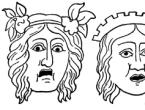Summary of the myth of Olympus. Legends and myths of Ancient Greece. What is a myth
No one is able to change the fate determined by moira, since the third moira, Atropos, puts everything that her sister’s person was assigned in life to a long scroll, and what is listed in the scroll of fate is inevitable. On the advice of her parents, Uranus-Heaven and Gaia-Earth, she retired to the island of Crete, and there, in a deep cave, her youngest son Zeus was born. Zeus draws good and evil from them and sends them to people. There is also a goddess of fate on Olympus - this is the goddess Tyukhe, the goddess of happiness and prosperity. Here is his wife Hera, and the golden-haired Apollo with his sister Artemis, and the golden Aphrodite, and the mighty daughter of Zeus Athena, and many other gods. Near the throne of Hera stands her messenger, the goddess of the rainbow, the light-winged Irida, always ready to quickly rush on rainbow wings to fulfill Hera's orders to the farthest reaches of the earth. When copying, a link to the narodstory website is required. The thread will break, and life will end. The picture of the life of the gods on Olympus is given according to the works of Homer - the Iliad and the Odyssey, glorifying the tribal aristocracy and the basileus who lead it as the best people, standing much higher than the rest of the population. And she, proud of her power, goes to the golden throne and sits next to the king of gods and people - Zeus. Neither rain nor snow occurs in the kingdom of Zeus; always there is a bright, joyful summer. Three beautiful Horas guard the entrance to the high Olympus and raise a thick cloud that closes the gate when the gods descend to earth or ascend to the bright halls of Zeus. Woe to that person to whom the thunderer draws gifts only from a vessel with evil. Kron did not suspect that he was deceived by his wife. There is no such force, no such power that could change at least something in what is destined for the gods and mortals. Moira Klotho spins the life thread of a person, determining the duration of his life. The fate of people is in the hands of Zeus; happiness and unhappiness, good and evil, life and death - everything is in his hands. They bring them ambrosia and nectar - the food and drink of the gods. Olympus. Zeus reigns high on the bright Olympus, surrounded by a host of gods. But although Zeus sends happiness and misfortune to people, the fate of people is still determined by the inexorable goddesses of fate - Moira, who live on the bright Olympus. Here comes the beautiful, majestic goddess Hera, the wife of Zeus. She convenes, at the command of the Thunderer, meetings of the gods on the bright Olympus, people's meetings on earth, observing that order and law are not violated. Two large vessels stand at the gates of the palace of Zeus. King Zeus sits on a high golden throne. The courageous, divinely beautiful face of Zeus breathes with greatness and proudly calm consciousness of power and might. He was afraid of his children.
Zeus reigns high on the bright Olympus, surrounded by a host of gods. Here is his wife Hera, and the golden-haired Apollo with his sister Artemis, and the golden Aphrodite, and the mighty daughter of Zeus Athena, and many other gods. Three beautiful Horas guard the entrance to the high Olympus and raise a thick cloud that closes the gate when the gods descend to earth or ascend to the bright halls of Zeus. High above Olympus, the blue, bottomless sky spreads wide, and golden light pours from it. Neither rain nor snow occurs in the kingdom of Zeus; always there is a bright, joyful summer. And clouds swirl below, sometimes they close the distant land. There, on earth, spring and summer are replaced by autumn and winter, joy and fun are replaced by misfortune and grief. True, the gods also know sorrows, but they soon pass, and joy is again established on Olympus.
The gods feast in their golden palaces built by the son of Zeus Hephaestus. King Zeus sits on a high golden throne. The courageous, divinely beautiful face of Zeus breathes with greatness and proudly calm consciousness of power and might. At his throne is the goddess of peace, Eirene, and the constant companion of Zeus, the winged goddess of victory Nike. Here comes the beautiful, majestic goddess Hera, the wife of Zeus. Zeus honors his wife: Hera, the patroness of marriage, is honored by all the gods of Olympus. When, shining with her beauty, in a magnificent outfit, the great Hera enters the banquet hall, all the gods stand up and bow before the wife of the Thunderer Zeus. And she, proud of her power, goes to the golden throne and sits next to the king of the gods and people - Zeus. Near the throne of Hera stands her messenger, the goddess of the rainbow, the light-winged Irida, always ready to quickly rush on rainbow wings to fulfill Hera's orders to the farthest reaches of the earth.
The gods feast. The daughter of Zeus, the young Hebe, and the son of the king of Troy, Ganymede, the favorite of Zeus, who received immortality from him, offer them ambrosia and nectar - the food and drink of the gods. Beautiful charites and muses delight them with singing and dancing. Holding hands, they dance, and the gods admire their light movements and marvelous, eternally young beauty. The feast of the Olympians becomes more fun. At these feasts, the gods decide all matters, at them they determine the fate of the world and people.
From Olympus, Zeus sends his gifts to people and establishes order and laws on earth. The fate of people is in the hands of Zeus; happiness and unhappiness, good and evil, life and death - everything is in his hands. Two large vessels stand at the gates of the palace of Zeus. In one vessel are gifts of good, in the other - of evil. Zeus draws good and evil from them and sends them to people. Woe to that person to whom the thunderer draws gifts only from a vessel with evil. Woe to the one who violates the order established by Zeus on earth and does not comply with his laws. The son of Kronos will menacingly move his thick eyebrows, then black clouds will cloud the sky. The great Zeus will be angry, and the hair on his head will rise terribly, his eyes will light up with an unbearable brilliance; he will wave his right hand - thunder will roll across the sky, fiery lightning will flash, and the high Olympus will shake.
Not only Zeus keeps the laws. At his throne stands the goddess Themis, who keeps the laws. She convenes, at the command of the Thunderer, meetings of the gods on the bright Olympus, people's meetings on earth, observing that order and law are not violated. On Olympus and the daughter of Zeus, the goddess Dike, who watches over justice. Zeus severely punishes unrighteous judges when Dike informs him that they do not comply with the laws given by Zeus. Goddess Dike is the protector of truth and the enemy of deceit.
Zeus keeps order and truth in the world and sends people happiness and sorrow. But although Zeus sends happiness and misfortune to people, nevertheless the fate of people is determined by the inexorable goddesses of fate - moira, living on the bright Olympus. The fate of Zeus himself is in their hands. Doom rules over mortals and over the gods. No one can escape the dictates of inexorable fate. There is no such force, no such power that could change at least something in what is destined for the gods and mortals. You can only humbly bow before fate and submit to it. Some moira know the dictates of fate. Moira Klotho spins the life thread of a person, determining the duration of his life. The thread will break, and life will end. Moira Lachesis draws, without looking, the lot that falls to a person in life. No one is able to change the fate determined by moira, since the third moira, Atropos, puts everything that her sister’s person was assigned in life to a long scroll, and what is listed in the scroll of fate is inevitable. Great, severe moira are inexorable.
Zeus reigns high on the bright Olympus (1), surrounded by many gods ... The beautiful Ores (2) guard the entrance to the high Olympus and raise a thick cloud that closes the gate when the gods descend to earth or ascend to the bright halls of Zeus. High above Olympus, the blue, bottomless sky spreads wide, and golden light pours from it. Neither rain nor snow occurs in the kingdom of Zeus; always there is a bright, joyful summer. And clouds swirl below, sometimes they close the distant land. There, on earth, spring and summer are replaced by autumn and winter, joy and fun are replaced by misfortune and grief. True, the gods also know sorrows, but they soon pass, and joy is again established on Olympus.
The gods feast in their golden palaces built by the son of Zeus Hephaestus (3). King Zeus sits on a high golden throne. The courageous, divinely beautiful face of Zeus breathes with greatness and proudly calm consciousness of power and might. At his throne is the goddess of peace, Eirene, and the constant companion of Zeus, the winged goddess of victory Nike. Here comes the beautiful, majestic goddess Hera, the wife of Zeus. Zeus honors his wife: Hera, the patroness of marriage, is surrounded by honor, all the gods of Olympus ...
The gods feast... bring them ambrosia and nectar - the food and drink of the gods. Beautiful charites and muses (4) delight them with singing and dancing. Holding hands, they dance, and the gods admire their light movements and marvelous, eternally young beauty. The feast of the Olympians becomes more fun. At these feasts, the gods decide all matters, at them they determine the fate of the world and people.
From Olympus, Zeus sends his gifts to people and establishes order and laws on earth. The fate of people is in the hands of Zeus; happiness and unhappiness, good and evil, life and death - everything is in his hands. Two large vessels stand at the gates of the palace of Zeus. In one vessel are the gifts of good, in the other - of evil. Zeus draws good and evil from them and sends them to people. Woe to that person to whom the thunderer draws gifts only from a vessel with evil. Woe to the one who violates the order established by Zeus on earth and does not comply with his laws. The son of Kronos will menacingly move his thick eyebrows, then black clouds will cloud the sky. The great Zeus will be angry, and the hair on his head will rise terribly, his eyes will light up with an unbearable brilliance; he will wave his right hand (5) - thunder will roll across the sky, fiery lightning will flash, and the high Olympus will shake ...
(1) Olympus - the sacred mountain of the ancient Greeks, considered the seat of the gods.
(2) Ores - goddesses who were in charge of the change of seasons, the order in nature.
(3) Hephaestus is the god of fire and blacksmithing.
(4) Charites (among the Romans - graces) - the patroness of beauty, joy, the personification of female charm; muses - patrons of singing, poetry, arts and sciences.
(5) The right hand is the right hand.
The Greek Mount Olympus is located in Thessaly. Its name is believed to mean "roundness", since the top, on which, according to the myths, the gods sat, was round, convenient for meetings. There, on top of Olympus, new palaces appeared for Zeus and other gods. They were built and decorated by the famous god of fire and blacksmithing, the son of Zeus Hephaestus. He also made golden carriages for the gods. And representatives of the new generation of the Olympian gods, the conquerors of the titans, rode down the mountain only in golden chariots. But more often the gods stayed at home, did their great deeds and enjoyed peace.
In the kingdom of Zeus, everything is like in paradise: there is always a blue sky overhead, any bad weather bypassed Olympus. The Olympians knew neither rain, nor snow, nor violent winds. Eternal summer reigned at the very top, it was always warm and cozy there, the air was filled with pleasant aromas. Zeus himself sat on a golden throne, two goddesses sat at his foot - the goddess of peace Ereina and the goddess of victory Nike.
When the gods gathered in the banquet hall, the wife of Zeus, the goddess Hera, sat next to her husband. Near Hera was her messenger, the goddess of the rainbow, the light-winged Irida, she was always ready to go to any corner of the earth to fulfill the instructions of her mistress. On the table of the gods, ambrosia and nectar are the most blessed food and drink, giving eternal youth, health and immortality. It is no coincidence that the gods have always had a good mood. This was also facilitated by the dancing goddesses of the Charites (among the Romans, grace) and the Muses. They have light movements, they led round dances, sang softly, trying to bring pleasure to all the Olympians. And the gods, not irritated by anything, in a calm atmosphere decided the fate of the world and people. At the same time, they did not forget who was in charge among them, and looked at Zeus, waiting for his orders.
Zeus was full of dignity, he understood that he was omnipotent, he was the main judge of everything around him. He could bestow happiness and good luck on worthy people, and he was ready to send diseases and even death to the unworthy. He knew who and how to punish. At the gates of his palace were two vessels: in one the gifts of good, in the other - evil.
Zeus was not always complacent and kind. If he noticed someone who violated the established order once and for all, then do not expect mercy. God instantly moved his eyebrows, and black clouds appeared in the sky, he waved his hand, and thunder clashes were heard, followed by lightning, which meant that a storm was coming. These storms brought many misfortunes to the earth. And people were afraid of the wrath of Zeus.
Zeus was helped to manage all affairs by the goddess Themis, who guards law and order, she also had the gift of a soothsayer. Zeus was also helped by his daughter, the goddess Dike, the protector of truth and the enemy of deceit. It was Dike who reported to Zeus about those who did not comply with the laws. But although Zeus sent happiness and misfortune to people, the fate of people was determined by the inexorable goddesses of fate - Moira (the Romans had parks), who also lived on the bright Olympus. The fate of Zeus himself is in their hands. Moira are invisible dark forces, they alone knew what was destined for a god or a person, and there is no such force and power that could change anything in the intended line of life.
Moira Klotho spun the life thread of a person, determining the duration of his life. And when the thread breaks, then life ends. Another moira, Lachesis, was in charge of the lots that fell to a person, she took them out without looking. And the third moira, Atropos, entered everything that was assigned in the life of her sister's man into a long scroll of fate, and this became inevitable.
Thus reigned, surrounded by a host of gods on Olympus, the great king of people and gods, Zeus, guarding order and truth throughout the world.
There is not a single people who would not have their own idea of the universe, the gods who rule life, as well as their struggle for power and influence. The myths of Ancient Greece, a summary of which we will consider in our article, are also special because they pay a lot of attention to man. Mighty heroes are of divine origin, but remain human - mortal and vulnerable, in need of help. And nothing human is alien to them.
What is a myth?
Before studying the myths of Ancient Greece (a brief summary - more is not available to us due to the volume of the article), it is worth understanding what it is - a "myth". In fact, this is a story that reflects people's ideas about the world and order in it, as well as the role of man in the universe. According to ancient authors, people were active participants, and not just a crowd that expected mercy from immortal celestials. But first things first.
Another feature of Greek myths is their high level of order and culture. In addition, their character changed depending on the region of the country, since each policy had its own, more revered gods and heroes, from whom, as the Greeks believed, the population originated. Of course, over time, the legends changed, acquired a different meaning. But the most important thing in them is the content that tells about the life of society in the primitive era, not only in Greece. Researchers note that many stories echo the myths of other peoples who lived at that time, which may indicate that they were created in parallel and carry a grain of truth. The myths of Ancient Greece, the summary of which we are considering, is an attempt to explain the world around us and pass on to descendants views on morality and relations in society.

What are the ancient Greek legends about?
We will talk very briefly about the essence of ancient legends, since many ancient Greek myths have come down to us. A brief summary of them can take a whole book. For example, Nikolai Kun, the most famous researcher of the ancient heritage, collected, streamlined and translated more than two hundred legends. Many of them are presented in the form of cycles. We will try to divide them into several groups. This:
- myths about the origin of the world and gods;
- stories about the titans and the battle of the gods with the titans;
- myths about the gods who lived on Olympus;
- labors of Hercules;
- stories about people and heroes (Perseus, Theseus, Jason); a cycle about the Trojan War, its causes, course and end, as well as the return of the heroes of the battle home (the main characters of the myths are Paris, Menelaus, Helen, Achilles, Odysseus, Hector, Agamemnon);
- myths about world exploration and colonization (Argonauts).
Myths of Ancient Greece (summary). About Zeus the Thunderer
The Greeks paid much attention to the main god of Olympus. No wonder, because the angry Thunderer could punish with lightning for a disrespectful attitude or send another grief, and even turn away from the person, which was even worse. Zeus was considered the youngest son of the titans Kronos and Rhea - time and the mother goddess. Rhea saved him from being swallowed, as Kronos was swallowing all of his children, fearing for his power.
Having matured, he overthrows his tyrant father and brings all his brothers and sisters back to life, and also distributes power between them. He himself was responsible for the wind, clouds, thunder and lightning, storm and hurricane. Zeus could calm the elements or send her, helped the offended and punished those who deserved it. However, he could not control fate.
The love affairs of Zeus also describe the myths of Ancient Greece, a summary of which we are studying. God had a passion for beautiful girls and goddesses and seduced them in every possible way. From them he had many children - gods and goddesses, heroes, kings. Many of them were disliked by Hera, the legal wife of the Thunderer, who often persecuted them and harmed them.

Instead of an epilogue
In the pantheon of the ancient Greeks there were many gods responsible for all branches of their life - agriculture, navigation, trade, war, crafts, the other world. However, there were also beings, demigods, who patronized science and art, followed justice and morality. This means that great attention was paid to these aspects.
Every cultured person should know what the ancient myths of Hellas tell us, so it’s worth reading them at least briefly. But reading them in their entirety allows you to plunge into a wonderful world full of interesting and unusual.




